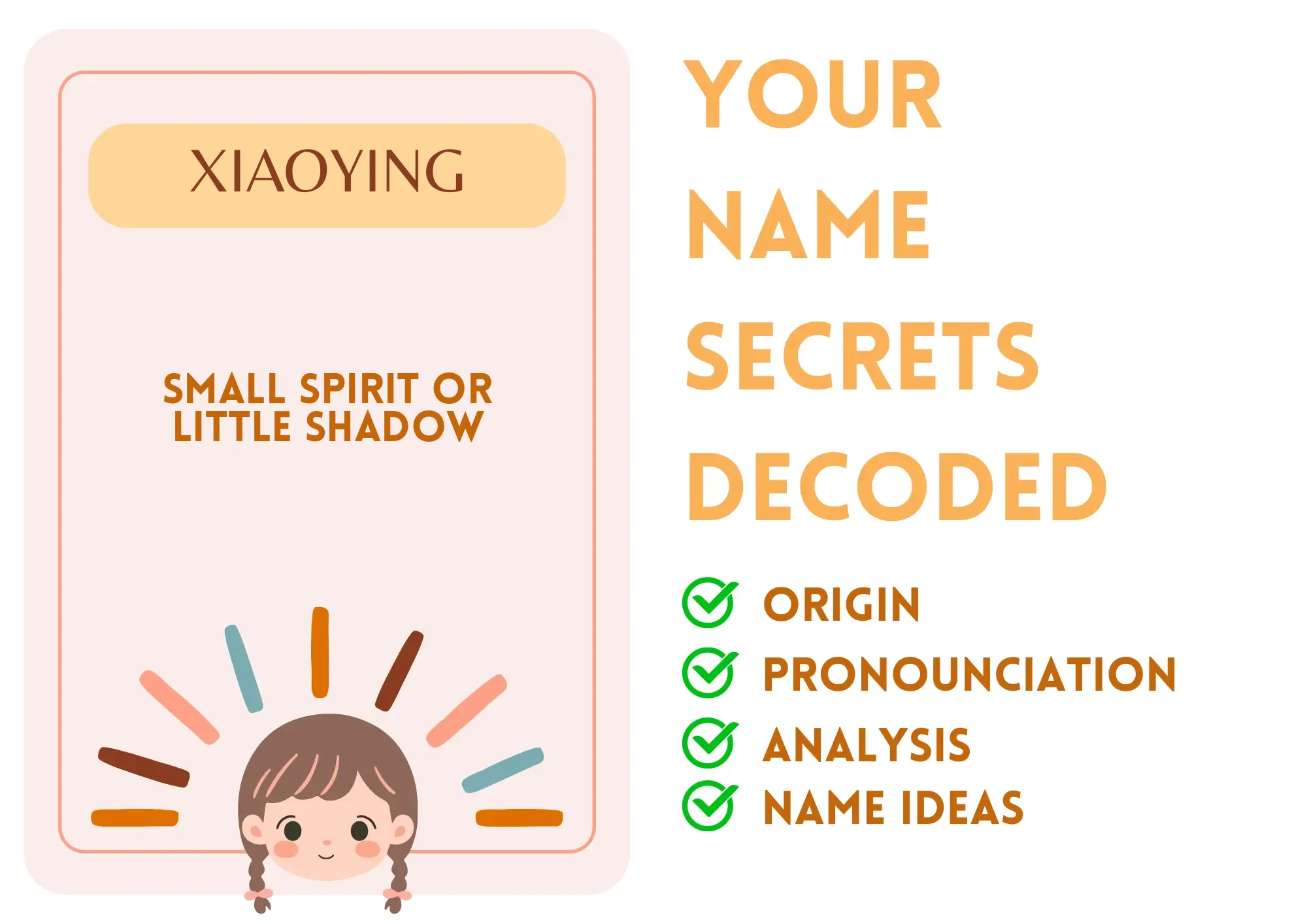
Xiaoying
Xiaoying is a charming and meaningful name of Chinese origin, often interpreted as 'small' or 'little' (小, 'xiao') combined with 'sound' or 'spirit' (影, 'ying'). It carries a gentle, affectionate tone. Xiaoying is predominantly a feminine name, used within both modern and traditional Chinese settings. It symbolizes both delicateness and a connection to nature through the imagery of 'little shadows' or 'little spirits.'
People frequently appreciate this name for its soft sound and cultural significance. Xiaoying is easy to pronounce but may require guidance in writing due to non-Latin characters. Common nicknames include Xiao or Ying.
Historically, Xiaoying reflects the traditional aspects of Chinese naming rituals, where names often convey deep meanings and aspirations for the child's personality and life. In modern media, Xiaoying can be found in various children's stories and representations, evoking feelings of warmth and whimsy.
Basic Information
Gender: Girl
Sounds Like: SHYOW-ying
Pronunciation Explanation: The first syllable is pronounced like 'shy' and 'ow' combined, while the second syllable 'ying' rhymes with 'sing'.
Summary and Meaning
Meaning: small spirit or little shadow
Origin: Xiaoying has its roots in the Chinese language, embedded in cultural practices and traditions.
Usage: Xiaoying is primarily a feminine name in Chinese culture, conveying gentleness and delicacy.
Name Number (Chaldean)
Name Number (Pythagorean)
Popularity (Global Rank)
Overall: 29583
Girls: 45779
Most Popular in
Religious and Cultural Significance
Religion: Buddhism
Background: In Chinese culture, the name is often associated with values from Confucianism and Buddhism, emphasizing harmony and tenderness.
Cultural Significance: The name exemplifies notions of beauty and nurturing, frequently chosen to impart a sense of peace and purity associated with femininity.
Historical Significance: Historically, names like Xiaoying emphasize familial values and express hopes for a child's character in Chinese society, where names can carry sentimental and philosophical weight.
Popular Culture
Literature and Mythology: Xiaoying can be found in various folk tales and children's stories in Chinese literature, often embodying themes of kindness and innocence.
Movies and Television: Characters named Xiaoying have appeared in Chinese films and TV dramas, typically representing youthful innocence or a gentle spirit.
Feelings and Perceptions
Perception: Xiaoying is generally perceived positively as a sweet, soft name. It conveys affection and warmth, appealing to those who appreciate its lyrical quality.
Positive Feelings: Gentle, loving, playful, warm, nurturing.
Negative Feelings: Might be considered overly cutesy or childish by some.
Practical Considerations
Ease of Writing and Calling: Xiaoying may present some challenge in writing for non-Chinese speakers, but its pronunciation is relatively straightforward for those familiar with Mandarin tones.
Common Typos and Misspellings: Xiaoyingg,Siaoying,Xiaoyin,Xiąoying
Common Nicknames: Xiao,Ying,Yingying
Xiaoying Popularity
Xiaoying Usage and Popularity By Country
| Country | Rank (Overall) |
|---|---|
| Singapore | 5246 |
| New Zealand | 7671 |
| Australia | 8485 |
| Japan | 8940 |
| Canada | 9310 |
| Switzerland | 9684 |
| Finland | 10118 |
| Cambodia | 10483 |
| Germany | 11323 |
| Ireland | 11597 |
Xiaoying Usage and Popularity By City
| City | Rank (Overall) |
|---|---|
| Shanghai | 701 |
| Peking | 645 |
| San Francisco | 5986 |
| Melbourne | 4930 |
| New York | 12035 |
| London | 11835 |
| Guangzhou | 679 |
| Los Angeles | 9099 |
| Boston | 5389 |
| Sydney | 8604 |
Compatibility Analysis
Famous Persons Named Xiaoying
Related Names
Similar Sounding Names:
Ying,Xiaolan,Xiaomei,Xiaojin